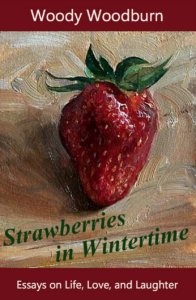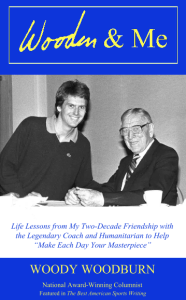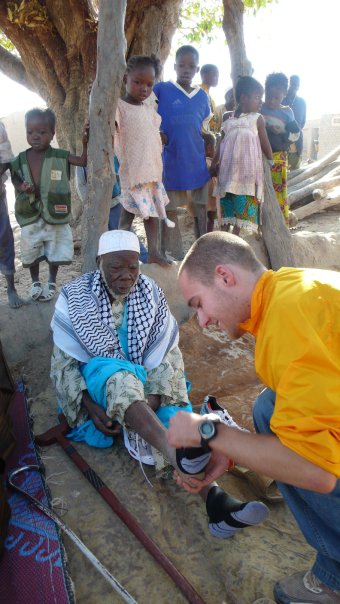 Imagine a teenager looking in the mirror while getting ready for prom and seeing an eyesore pimple. That’s the kind of chill I felt the other day when I put on my favorite pullover and spotted a small hole, impossible to miss, in the front.
Imagine a teenager looking in the mirror while getting ready for prom and seeing an eyesore pimple. That’s the kind of chill I felt the other day when I put on my favorite pullover and spotted a small hole, impossible to miss, in the front.
Understand, I have had this wool, olive green, quarter-zipper, vintage Patagonia pullover for close to two decades, and have babied it for half that time trying to extend its life as long as possible. As a result, it has spent more time inside a dresser drawer than out in the world, which is not a good thing.
Also as a result, it has made more than its share of appearances at happy gatherings and special events, which is a good thing. The unsightly new blemish, however, promised to retire Ol’ Green from marquee billing.
 While age finally claimed its youthful beauty, I did not want the small hole to get stretched and pulled and torn into a larger one. “A stitch in time saves nine” but, alas, my skill with needle and thread is limited to sewing a button back on a shirt. Meanwhile, my wife felt the emotional pressure of a surgeon being asked to operate on a loved one and begged out.
While age finally claimed its youthful beauty, I did not want the small hole to get stretched and pulled and torn into a larger one. “A stitch in time saves nine” but, alas, my skill with needle and thread is limited to sewing a button back on a shirt. Meanwhile, my wife felt the emotional pressure of a surgeon being asked to operate on a loved one and begged out.
My next thought was to ask my dear Betsy Ross-like friend Kathy. I wish you could see her handiwork on Ol’ Green. Darned if her darning isn’t masterful. The interwoven needlework is nearly invisible.
In truth, I’m actually glad the repair is slightly visible. I say this after thinking about the Shakers who were renowned for their furniture design and craftsmanship, yet deliberately introduced a “mistake” into the things they made in order to show that man should not aspire to the perfection of God. Flawed, they believed, could be ideal.
Ol’ Green is now similarly ideal.
Navajos, echoing the Shakers, purposely weave a single imperfection into their handmade blankets. To their eyes this makes the blankets more, not less, beautiful. In his terrific book, “Blood and Thunder: The Epic Story of Kit Carson and the Conquest of the American West,” author Hamptom Sides elaborates on this mindset:
“Navajos hated to complete anything – whether it was a basket, a blanket, a song, or a story. They never wanted their artifacts to be too perfect, or too close-ended, for a definitive ending cramped the spirit of the creator and sapped the life from the art. So they left little gaps and imperfections, deliberate lacunae that kept things alive for another day.
“Even today Navajo blankets often have a faint imperfection designed to let the creation breathe – a thin line that originates from the center and extends all the way to the edge, sometimes with a single thread dangling from its border. Tellingly, the Navajos call the intentional flaw the ‘spirit outlet.’ ”
Henceforth, I will take the Shakers’ and Navajos’ perspectives to heart when I wear Ol’ Green and embrace its repaired imperfection as a “spirit outlet.”
“Kintsugi” also comes to my mind, which is the Japanese practice of repairing broken pottery with seams of gold and, in the process, making the object even more beautiful for having been broken. That is exactly how I feel about my beloved pullover.
From now on, instead of saving Ol’ Green for special occasions I am going to wear it regularly. And when future holes and “spirit outlets” appear, and surely they will, I may ask Kathy to perform her seamstress wizardry with gold thread instead of perfectly matched olive.
Ol’ Green-and-Gold will then be even more beautiful than ever.
* * *
Woody Woodburn writes a weekly column for The Ventura County Star and can be contacted at WoodyWriter@gmail.com. Follow him on Twitter and Instagram at @woodywoodburn. His SIGNED books are available at www.WoodyWoodburn.com.

 Personalized Signed copies of WOODEN & ME: Life Lessons from My Two-Decade Friendship with the Legendary Coach and Humanitarian to Help “Make Each Day Your Masterpiece” and “Strawberries in Wintertime: Essays on Life, Love, and Laughter” are available at WoodyWoodburn.com
Personalized Signed copies of WOODEN & ME: Life Lessons from My Two-Decade Friendship with the Legendary Coach and Humanitarian to Help “Make Each Day Your Masterpiece” and “Strawberries in Wintertime: Essays on Life, Love, and Laughter” are available at WoodyWoodburn.com


